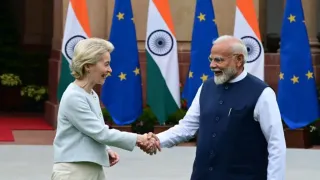Russia is facing a severe population challenge, with birth rates plummeting to their lowest levels in 25 years. To address this crisis, the government, led by President Vladimir Putin, is exploring unconventional methods to boost population growth, including the establishment of a ‘Ministry of Sex.’ This potential new ministry is part of a broader strategy termed a “special demographic operation” to reverse the population decline.
Bizarre Proposals to Boost Birth Rates
The Russian authorities have rolled out numerous unconventional proposals aimed at encouraging couples to have more children:
- Internet and Light-Free Evenings: One notable suggestion involves creating designated periods from 10 p.m. to 2 a.m., during which citizens would turn off the internet and lights to foster intimacy among couples.
- Financial Incentives for Dates: Couples might receive up to 5,000 roubles (approx. Rs 4,302) as a government-funded incentive for their first dates.
- State-Sponsored Wedding Nights: Newlywed couples could have their wedding nights financed by the state, with a spending cap of 26,300 roubles (approx. Rs 22,632), to promote post-marriage pregnancies.
Some proposals go even further, such as compensating stay-at-home mothers for household duties and counting this work toward their pensions.
Regional Initiatives
Various Russian regions have launched independent programs to support national efforts:
- Khabarovsk: Women aged 18 to 23 are offered £900 (approx. Rs 98,029) as an incentive for having children.
- Chelyabinsk: The region provides a significantly higher reward of £8,500 (approx. Rs 9.26 lakh) for the first child.
Sex-at-Workplace and Other Extreme Ideas
Regional Health Minister Dr Yevgeny Shestopalov previously suggested integrating “sex-at-workplace” policies, encouraging couples to use lunch breaks for procreation. This proposal drew widespread attention, with Shestopalov emphasizing, “Life flies by too quickly, so use breaks to engage in procreation.”
The ‘Ministry of Sex’ Petition
The idea of forming a Ministry of Sex was put forward by the GlavPR agency and is currently under review by Nina Ostanina, head of the Russian Parliament’s Committee on Family Protection and a Putin supporter. Ostanina had earlier championed the need for a “special demographic operation” to address Russia's declining birth rate, comparing it to the military operation in Ukraine.
Efforts to collect data on women's reproductive intentions have also sparked controversy. Female public sector employees in Moscow have been required to fill out detailed questionnaires on their sexual and reproductive health. Questions cover topics like contraceptive use, infertility issues, and plans for future children. Women who did not comply were called for in-person interviews with state doctors.
Anti-Child-Free Campaigns
The Russian parliament has considered laws imposing fines on individuals and media promoting a ‘child-free’ lifestyle. This approach targets content discouraging childbirth, aligning with the government’s mission to counter the declining birth rate.
Fertility Testing Programs
Moscow has also initiated free fertility tests, which have so far drawn 20,000 participants. Deputy Mayor Anastasia Rakova emphasized that initial findings revealed a significant number of women needed to prioritize motherhood over other life goals.
Alarming Statistics
According to Rosstat, the national statistics agency, 599,600 children were born in the first half of 2024—16,000 fewer than the same period in 2023, marking the lowest number since 1999. In June 2024, births dropped by 6% to 98,600, falling below the monthly 100,000 threshold for the first time. Kremlin spokesperson Dmitry Peskov described the situation as “catastrophic for the future of the nation.”
Impact of the Ongoing War
The ongoing conflict in Ukraine, which has entered its third year, compounds the demographic crisis. With significant casualties and uncertainties, particularly in border regions, families are hesitant to expand due to the unstable security situation.
Also Read: Mukaab: All You Need to Know About the World Biggest Building























